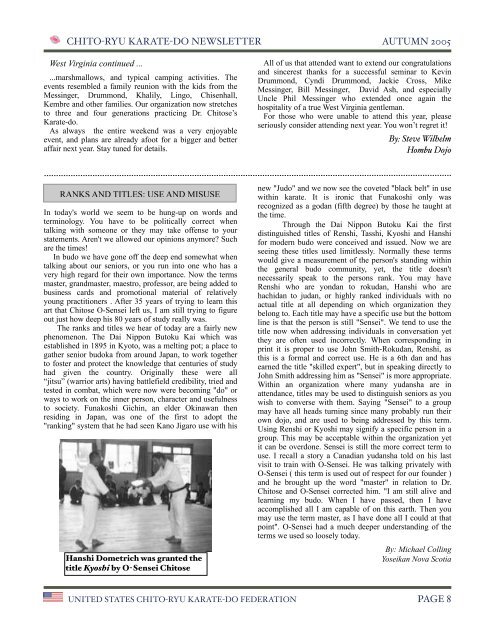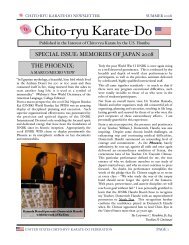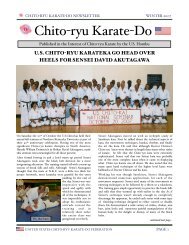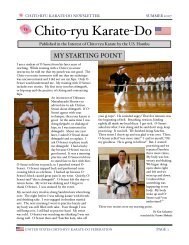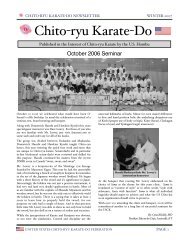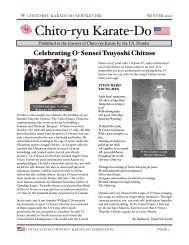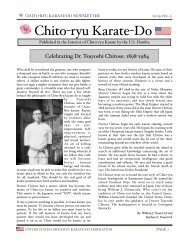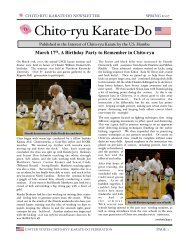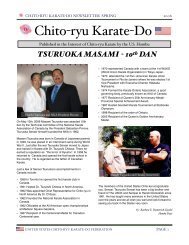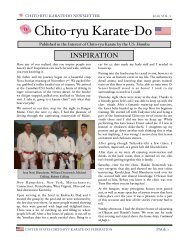Confucius - United States Chito-ryu Karate Federation
Confucius - United States Chito-ryu Karate Federation
Confucius - United States Chito-ryu Karate Federation
You also want an ePaper? Increase the reach of your titles
YUMPU automatically turns print PDFs into web optimized ePapers that Google loves.
CHITO-RYU KARATE-DO NEWSLETTER AUTUMN 2005<br />
West Virginia continued ...<br />
...marshmallows, and typical camping activities. The<br />
events resembled a family reunion with the kids from the<br />
Messinger, Drummond, Khalily, Lingo, Chisenhall,<br />
Kembre and other families. Our organization now stretches<br />
to three and four generations practicing Dr. <strong>Chito</strong>se’s<br />
<strong>Karate</strong>-do.<br />
As always the entire weekend was a very enjoyable<br />
event, and plans are already afoot for a bigger and better<br />
affair next year. Stay tuned for details.<br />
RANKS AND TITLES: USE AND MISUSE<br />
In today's world we seem to be hung-up on words and<br />
terminology. You have to be politically correct when<br />
talking with someone or they may take offense to your<br />
statements. Aren't we allowed our opinions anymore? Such<br />
are the times!<br />
In budo we have gone off the deep end somewhat when<br />
talking about our seniors, or you run into one who has a<br />
very high regard for their own importance. Now the terms<br />
master, grandmaster, maestro, professor, are being added to<br />
business cards and promotional material of relatively<br />
young practitioners . After 35 years of trying to learn this<br />
art that <strong>Chito</strong>se O-Sensei left us, I am still trying to figure<br />
out just how deep his 80 years of study really was.<br />
The ranks and titles we hear of today are a fairly new<br />
phenomenon. The Dai Nippon Butoku Kai which was<br />
established in 1895 in Kyoto, was a melting pot; a place to<br />
gather senior budoka from around Japan, to work together<br />
to foster and protect the knowledge that centuries of study<br />
had given the country. Originally these were all<br />
“jitsu” (warrior arts) having battlefield credibility, tried and<br />
tested in combat, which were now were becoming "do" or<br />
ways to work on the inner person, character and usefulness<br />
to society. Funakoshi Gichin, an elder Okinawan then<br />
residing in Japan, was one of the first to adopt the<br />
"ranking" system that he had seen Kano Jigaro use with his<br />
Hanshi Dometrich was granted the<br />
title Kyoshi by O-Sensei <strong>Chito</strong>se<br />
All of us that attended want to extend our congratulations<br />
and sincerest thanks for a successful seminar to Kevin<br />
Drummond, Cyndi Drummond, Jackie Cross, Mike<br />
Messinger, Bill Messinger, David Ash, and especially<br />
Uncle Phil Messinger who extended once again the<br />
hospitality of a true West Virginia gentleman.<br />
For those who were unable to attend this year, please<br />
seriously consider attending next year. You won’t regret it!<br />
By: Steve Wilhelm<br />
Hombu Dojo<br />
new "Judo" and we now see the coveted "black belt" in use<br />
within karate. It is ironic that Funakoshi only was<br />
recognized as a godan (fifth degree) by those he taught at<br />
the time.<br />
Through the Dai Nippon Butoku Kai the first<br />
distinguished titles of Renshi, Tasshi, Kyoshi and Hanshi<br />
for modern budo were conceived and issued. Now we are<br />
seeing these titles used limitlessly. Normally these terms<br />
would give a measurement of the person's standing within<br />
the general budo community, yet, the title doesn't<br />
necessarily speak to the persons rank. You may have<br />
Renshi who are yondan to rokudan, Hanshi who are<br />
hachidan to judan, or highly ranked individuals with no<br />
actual title at all depending on which organization they<br />
belong to. Each title may have a specific use but the bottom<br />
line is that the person is still "Sensei". We tend to use the<br />
title now when addressing individuals in conversation yet<br />
they are often used incorrectly. When corresponding in<br />
print it is proper to use John Smith-Rokudan, Renshi, as<br />
this is a formal and correct use. He is a 6th dan and has<br />
earned the title "skilled expert", but in speaking directly to<br />
John Smith addressing him as "Sensei" is more appropriate.<br />
Within an organization where many yudansha are in<br />
attendance, titles may be used to distinguish seniors as you<br />
wish to converse with them. Saying "Sensei" to a group<br />
may have all heads turning since many probably run their<br />
own dojo, and are used to being addressed by this term.<br />
Using Renshi or Kyoshi may signify a specific person in a<br />
group. This may be acceptable within the organization yet<br />
it can be overdone. Sensei is still the more correct term to<br />
use. I recall a story a Canadian yudansha told on his last<br />
visit to train with O-Sensei. He was talking privately with<br />
O-Sensei ( this term is used out of respect for our founder )<br />
and he brought up the word "master" in relation to Dr.<br />
<strong>Chito</strong>se and O-Sensei corrected him. "I am still alive and<br />
learning my budo. When I have passed, then I have<br />
accomplished all I am capable of on this earth. Then you<br />
may use the term master, as I have done all I could at that<br />
point". O-Sensei had a much deeper understanding of the<br />
terms we used so loosely today.<br />
By: Michael Colling<br />
Yoseikan Nova Scotia<br />
UNITED STATES CHITO-RYU KARATE-DO FEDERATION PAGE 8


